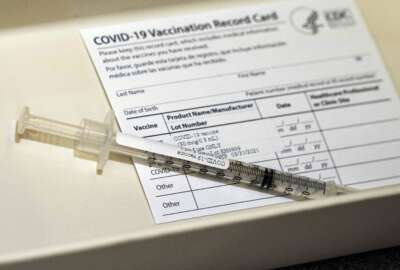
Contractors assess the just released details of White House COVID-19 protocols
For an industry reaction, the Executive Vice President for Policy at the Professional Services Council Stephanie Kostro spoke to Federal Drive with Tom Temin.
Best listening experience is on Chrome, Firefox or Safari. Subscribe to Federal Drive’s daily audio interviews on Apple Podcasts or PodcastOne.
The Biden administration has released details of what are known as class deviations – allowable changes and the Federal Acquisition Regulation to take into account the ongoing COVID pandemic – and what contractors have to do for their own safety and that of federal employees they encounter. For an industry reaction, the Executive Vice President for Policy at the Professional Services Council Stephanie Kostro spoke to Federal Drive with Tom Temin.
Interview transcript:
Tom Temin: And Stephanie, there’s a lot to unpack here. And give us your take on the read of those class deviations, which I guess there was some opportunity for industry comment on. Now they have been finalized in the last few days. What are they telling us? And what are they not telling us?
Stephanie Kostro: Thanks so much, Tom, for asking. And I would like to preface my remarks by saying the Biden administration has done quite a bit of outreach to industry both through the associations and then through our member companies. And so Professional Services Council (PSC) is not the only industry association that’s been feeding back into the Office of Management and Budget, Department of Defense and others. I would say that we were somewhat disappointed a bit with the class deviations that came out late last week, they were signed out on Sept. 30, resulting from a document that came out on the 24th from the Safer Federal Workforce Task Force – I’ll just refer to it as the task force. That task force put out 14 pages of guidance to address contractor safety protocols, one on vaccinations, two on masking, distancing, and three on how all of this is going to be coordinated within each company. The class deviations really reflect implementation of those protocols. And it affects predominantly services and contracting – or construction contractor companies. And there are carve outs for several different kinds of contractors. And I would say one thing that we were looking at in anticipation, we were going to be looking for how exactly would this apply to companies? Would there be a test option? Or is it solely vaccination or lack of employment, you know, either resigning or termination of someone’s employment? And I would say that DoD came out with something, GSA came out with something, in some interpretations, they are internally conflicting and absolutely confusing. And so we are still engaging with those government organizations I mentioned earlier, to make sure we can get clarity on exactly who this applies to, when it applies to them, and what exemptions are on the table.
Tom Temin: And you mentioned construction companies – what about product companies? Especially what about services companies that are the ones that are actually on premise, and entering federal agencies with badges?
Stephanie Kostro: There are rules and requirements for folks who want to access a government facility. DoD put something out in early September regarding, if you want to get into the Pentagon, you have to show proof of vaccination or an attestation form, or be diverted over to be tested periodically, if you were not vaccinated or unwilling to say that you were vaccinated. So regarding the class deviations that came out last week, those are specific to services and construction contractors. There is an exemption for products manufacturers or contracts solely for the provision or manufacturer of products. That is something we at the Professional Services Council are asking questions about because to us that creates an unlevel playing field. And I’ll go into that just briefly, if I might. That is to say, if you are a services contractor, and you have high demand, highly skilled employees who don’t want to get vaccinated, they might very well resign and go to work for a products company. It creates a potential for human capital flight from some of the services contractors who are being forced to vaccinate, whereas products companies are not. There are other carve outs as well. Some of them, one might argue make sense in terms of, if you’re below the simplified acquisition threshold, so you’re a contractor, but your contract is worth less than $250,000. This does not impact them. If you’re a member of an Indian tribe and answer to a different sovereignty than the United States government, this does not impact you. But we are asking questions about the difference in treatment for services versus products contractors.
Tom Temin: And I wonder what this means to companies that are both services and product contractors? I’m thinking say a company like Dell – one half, they do a lot of consulting for the government. They do a lot of program development, application development and services, professional services areas. And then they have this big manufacturing arm that sells a lot of the laptops and desktops that government uses by the millions. So is it possible to discern what a company like that has to do, where you have both sides of the house?
Stephanie Kostro: So that’s a great observation, Tom, because there has been a general government trend to procure things as-a-service where they used to buy products. For example, IT services versus products or software-as-a-service and not as a product. There are lots of companies out there that are both products and services. Our understanding and our read of both the guidance from the task force and the class deviations that came out is that if you have a services contract or subcontract that is a covered contract and you have to be vaccinated or qualify for a medical disability or religious exemption. Or, if you’re in a facility where work is being undertaken on behalf of the U.S. government, everyone in that facility has to be vaccinated regardless of whether you’re on that contract or just working in connection with a contract.
Tom Temin: We’re speaking with Stephanie Kostro, executive vice president for Policy at the Professional Services Council. And I guess, would you agree that the administration is at least trying to make that distinction between companies that ship in things in FedEx boxes, or Postal Service boxes, as opposed to those companies where you’re working alongside the government?
Stephanie Kostro: It would on its face of it, but you have to remember that the objective of this policy, and the reason the executive order was signed out was to increase vaccination rates. And you don’t increase vaccination rates by making whole classes of contractors exempt and making an uneven playing field like we just discussed. And so at that point, you have to wonder, is it because they want it to be able to access commercial-off-the-shelf technologies, or something of that, like? I would say, again, if your goal is increased vaccination rates, this is not how you build that railroad, so to speak.
Tom Temin: Sure, yeah.
Stephanie Kostro: It’s a hell of a way to run a railroad.
Tom Temin: Good point. And let me ask you this, among the members of the Professional Services Council, the companies, what’s your sense of the degree to which their employees are just going ahead and getting vaccinated? I would imagine that among professional services companies, doing consulting, financial work, software development, you’re going to get a population that is generally going to be vaccinated for their own sake, regardless of whether it’s a mandate.
Stephanie Kostro: That’s true, when the president announced in early September that this was coming down, and that we would be seeing guidance and class deviations on this, particularly, companies have, in some sense, had their own internal mandates to be vaccinated. I would say also that we at PSC recently asked our membership and polled them and ask them, how many of your employees have resigned or separated from your company? How many of them have voiced the intent to do so if this is going to be a requirement? We’ve also asked on the recruitment side of your candidate pool, is this a real point of anxiety for folks? Are they asking about vaccine requirements or not. And so one issue that has also come up when we’ve pulled our member companies, some of them, say where he we had this vaccine mandate in place before this class deviation came out, it’s not going to be a problem for us. Others are saying we’re gonna lose half of our workforce. And so that’s a real concern. The other concern is, there are exemptions for medical disability or for religious reasons. There’s not a lot of guidance from the government about what constitutes a religious exemption in this case. And it could be that companies can choose to accept or not accept an application for a religious exemption. And that does open them up to lawsuits. So one thing we are also pushing, in addition to, hey, can we not have a level playing field about who is subject to this mandate? But how can we indemnify companies from lawsuits, companies that are just trying to comply with the US government requirement, but facing lawsuits from their employees who don’t want to be vaccinated? You’ve asked for indemnification or consideration thereof. And the government has turned around and said, well, you could apply for recourse to reimburse for legal fees. But unfortunately, that does no good to a company that’s already gone bankrupt because of lawsuits. And so that’s a real concern as well.
Tom Temin: And have you seen any lawsuits actually happen at this point? Or is that just a theoretical fear, insofar as you can tell among your constituents?
Stephanie Kostro: When we’ve polled our member companies, they’ve indicated that they’ve heard of lawsuits. I don’t know of any that have been filed to date. Because again, the vaccine mandate is not actually a mandate just yet. We just got the class deviation a handful of days ago.
Tom Temin: All right. And those are then final these class deviations, there’s the comment period came and went in a hurry by the way. You implied that in beginning we didn’t talk about that issue, but there wasn’t really that much opportunity to really get into it with the administration. They just listened briefly, but now it’s do or die.
Stephanie Kostro: It is do or die, I would say they are following the FAR process by making these part of the Federal Acquisition Regulations going forward. But the class deviations are in effect until that’s become a final regulation. And so it is do or die, these are going to be part of the contracts going forward. And there will be a contract clause within the FAR going forward after a comment period on that.
Tom Temin: Stephanie Kostro is executive vice president for policy at the Professional Services Council. As always, thanks so much.
Stephanie Kostro: Thanks, Tom.
Copyright © 2025 Federal News Network. All rights reserved. This website is not intended for users located within the European Economic Area.
Tom Temin is host of the Federal Drive and has been providing insight on federal technology and management issues for more than 30 years.
Follow @tteminWFED




